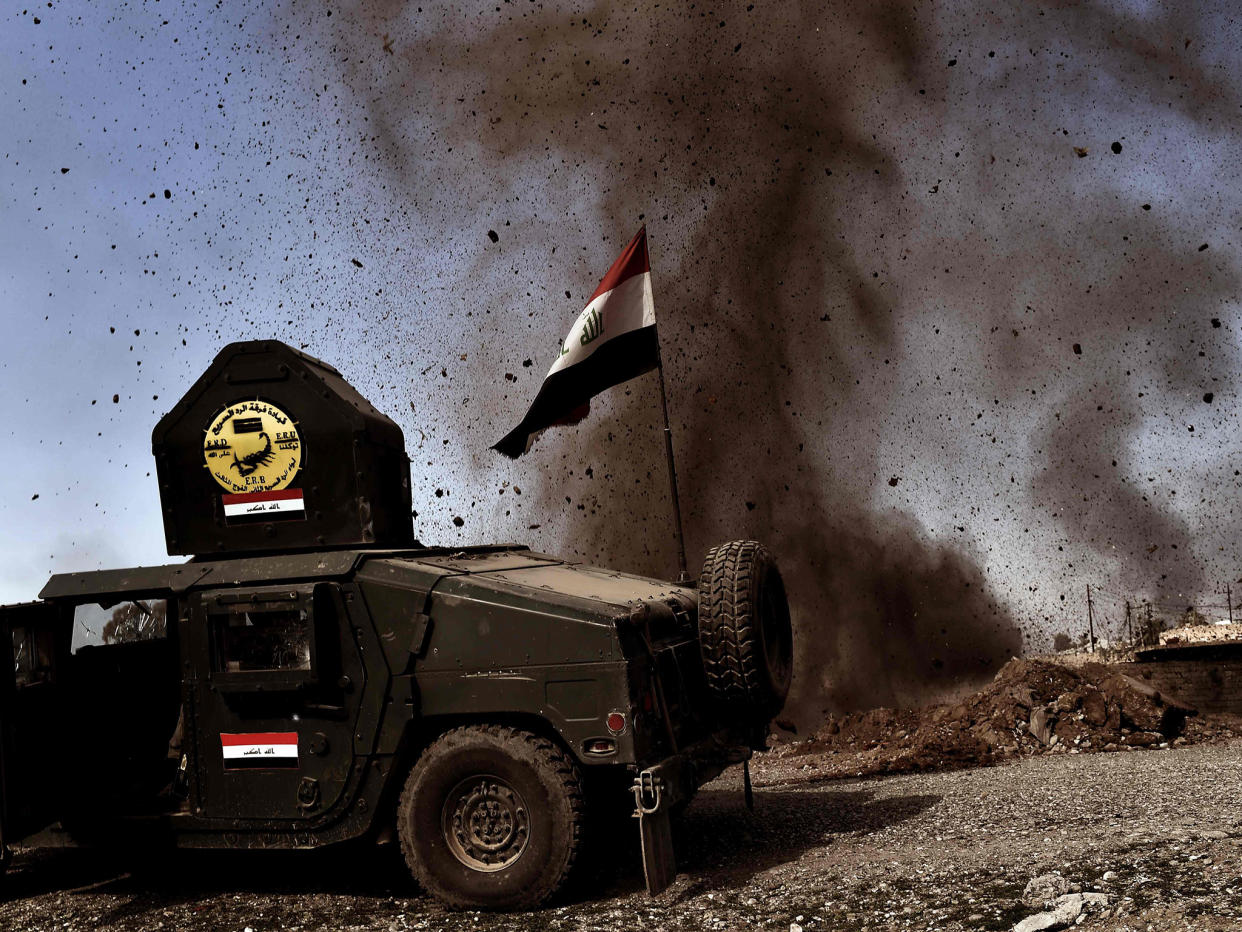Mosul offensive: Letters of hope and love dropped on trapped civilians as Isis resists advance by Iraqi forces

Thousands of letters of love and hope have been dropped on western Mosul amid fears for an estimated 750,000 civilians trapped in Isis-held parts of the city.
One letter uncovered by reporters embedded with Iraqi troops was from a man called Omar, who was writing to his family and friends from a retaken district of the city.
“I just want to let you know what we are safe here,” it said. “I hope your areas will be liberated by government forces as soon as possible and be free from Isis fighters.”
The hand-written message urged loved ones not to go outside during fighting, according to a translation by the New York Times, and was signed off with: “We are all Iraq, I love you.”
It was among four million letters dropped over Isis-held parts of Mosul since December as part of a project by the non-profit The Institute for War and Peace Reporting (IWPR).
Penned by Iraqis across the country and gathered by volunteers, more than 2,000 letters were photocopied and showered from a transport plane.
“You will return to your most beautiful days with your family and you will hear the prayers of the mosques in Mosul sky, the culture and science will return because everything been robbed from you will come back to you,” one read.
Another said: “Our people in Mosul, we are with you in our hearts and souls, I cannot find the right words to express to you but do not forget you are part of Iraq, and we will not abandon you. Victory will come soon, God willing.”
Around 1,000 civilians crossed front lines to meet government troops on Saturday in the largest movement since fighting intensified last week but there were concerns over deteriorating humanitarian conditions for those remaining under almost constant bombardment.
An advance by Iraqi forces has slowed amid bloody resistance from jihadis, who are deploying using weaponised drones, car bombs, IEDs, sniper fire and mortars while attempting to entrench themselves in residential districts.
Special forces Lt-Gen Abdul-Wahab al-Saadi told the Associated Press that his troops were “moving very slowly” but he expected the pace to increase after Iraqi forces cut off Isis supply lines in Mosul’s south-western edge.
Government forces, backed by Kurdish Peshmerga fighters and international special forces from the US, UK and elsewhere, are firing shells and rockets on to Isis positions.
The US-led coalition is also launching a hail of air strikes, which Central Command said has destroyed Isis targets including mortar systems, command positions, sniper units, car bomb factories, fighting positions and a drone storage facility in recent days.
Militants have been increasing their use of weaponised drones in Iraq, dropping customised grenades and small explosives on enemy forces, vehicles and tanks before releasing footage of successful strikes on propaganda channels.
The devices have caused relatively few deaths but sparked the procurement of counter-measures after causing significant disruption to ground operations and carrying out detailed surveillance that could threaten advancing troops.
The United Nations cautioned that men, women and children inside Isis territory remain at extreme risk from the assault after finding that almost half of casualties in the military operation to retake eastern Mosul were civilians.
Over the Tigris river, the western side of the city is far more densely populated, with Isis killing anyone it finds attempting to flee.
Tom Robinson, Oxfam’s emergency team lead in Iraq, said he was “deeply concerned” for hundreds of thousands of civilians who remain trapped.
“These people have survived 30 months under Isis rule and need support to find safety, shelter and sustenance,” he added.
“We call on all armed forces to take all feasible measures to protect them.”
The International Rescue Committee said the advance on western Mosul is the operation’s “most dangerous phase” and a terrifying period for the city’s remaining residents.
Jason Kajer, the charity’s acting country director for Iraq, said: “There is a real danger that the battle will be raging around them for weeks and possibly months to come.
“More than 1,750 civilians were hurt in the fight to retake eastern Mosul and the west of the city is far more densely populated. To prevent an even greater number of civilian casualties everything must be done to keep civilians out of the firing line and as Iraqi forces reach individual neighbourhoods people must be given the opportunity to escape the city safely.”
Dozens of families gathering just beyond the front lines told journalists they were originally from villages outside the city but were forced to march inside months ago to serve as human shields for Isis fighters.
“We’ve been through terrible times,” said Juri Fathi, a mother of six who was forced to live in a school building for three months. “I had to burn my children’s clothing just for warmth.”
Iraqi forces declared eastern Mosul “fully liberated” in January after officially launching the operation to retake the city in October, but analysts have warned the battle could continue for months.
A Kurdish journalist became the latest reporter killed while covering ongoing operations, when she was fatally injured by a roadside bomb in the recently retaken town of Abu Saif.
Shifa Gerdi, a 30-year-old presenter and the head of output for Rudaw television, was described as one of the organisation’s “most daring journalists” as condolences poured in from around the world.


